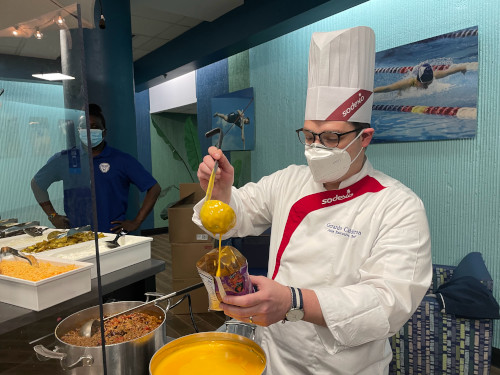
Why mobilized dining could reinvent campus food services
Mobilized dining services offer an innovative and cost-effective approach to the changing needs of campus dining programs
By Steve Shaheen, CEO, Definitive Technology Group August 17th, 2022Campus dining services have evolved significantly since Harvard University opened the country’s first college dining hall in 1766. Today, the prestigious school serves an average of 22,000 meals a day, or 5 million meals annually. Harvard and many other colleges and universities leverage their food service programs in their marketing efforts to attract new students and faculty, claiming “personalized options,” five-star culinary experiences,” and “farm-fresh, local offerings.”
However, customized salad stations, wood brick pizza ovens, and panini bars in the campus dining halls may no longer be enough to get you a spot on one of the many “best college dining” lists.
Today, some colleges have dining halls within dormitories, kosher-only dining halls, farm-to-table options, fully immersive culture experiences, and even call-ahead pick-up windows to enable students to skip the lines. Meanwhile, many schools have also formed partnerships with local restaurants and national retail chains to enable students to use ‘dining dollars’ at these establishments. Options have become the name of the game.
While economics, competition and student satisfaction are the driving forces behind these moves, more recently, other factors have come into play causing dining service directors to think outside the box to redefine their business models further. One of those factors is the recent pandemic. It’s been more than two years since COVID first upended the lives of nearly twenty million U.S. college students and wreaked havoc on college campuses as well as all other congregate settings. That part is well known. What’s not as well-known is the creative ways some schools have responded to ensure student and staff needs for safe and healthy on-campus food and beverage services are met.
Pivot became the operative word.
Just as other food service environments were launching ghost kitchens, virtual kitchens, food-to-go, and other models virtually unheard of several years ago, some innovative universities embraced new initiatives that enabled them to safely meet the students where they were. Mobilized dining services represent one example of a new model of food and beverage service preparation and delivery that began out of necessity during the pandemic and now has established benefits that go well beyond.
Sodexo launched a pilot program in 2021 across a dozen campus sites throughout the U.S., including Brandeis University, Merrimack College, Curry College, University of Texas, Loyola Marymount University, and Creighton University, among others. They deployed mobile, battery-powered carts that enabled food service directors to bring a wide array of food and beverage services and made-to-order cooking directly to students and faculty throughout the campuses, including residence halls, campus events and other common areas.
The carts served as an extension of the dining halls and offered an innovative way for the schools to resume vital community connections and provide healthy, fresh, and creative dining services, while maintaining safe social distancing.
Schools like Curry College had previously created pop-up stations for special events but were limited in what they could offer due to the need to be close to an AC power source, as well as other factors. Curry tried using eight-foot tables as temporary serving stations at residential halls but was limited in the variety of options it could offer. With mobile, battery-powered food service carts, dining services providers have been able to prepare and offer an endless selection of food and beverage options using blenders, ovens, grills, refrigerators, freezers, wireless POS services and other features in any location throughout the campus. They now offer mobile ice cream sundae bars, occasional milk & cookie nights, and other unique offerings that help differentiate their dining services. As a result, student satisfaction ratings grew by four percent – at a time when many universities were seeing decreased student satisfaction in the double digits.
Other schools have taken the mobile workstations in additional creative directions. During the Sodexo pilot program, Creighton University launched mobile farm-to-table omelet stations; Brandeis University created Trending Stations with tossed popcorn varieties; Merrimack College offered a walking nacho bar, Valentine treats, and a fully stocked hot chocolate bar; and Loyola Marymount University created a mobile Super Bowl Tailgate party complete with Bratwurst sandwiches and all the fixings.
Unexpected benefits emerge.
In addition to creatively addressing the pandemic-related challenges of safely delivering food and beverages to students and staff, mobilized dining services also enabled college campuses to increase their flexibility to address other issues that have emerged over the past few years, such as labor shortages and supply chain disruptions.
The carts are also being monetized by student-run organizations, clubs, sports teams, alumni networks, and other groups. The mobile, battery-powered carts have enabled these groups to be at the right location any time to take advantage of peak foot traffic, a sporting event or other special occasion.
While it started as a creative response to a devastating pandemic, mobilized dining services have emerged as an innovative way to meet the changing needs of campus dining programs efficiently, safely, and cost-effectively.
About the Author:Steve Shaheen is the CEO of Definitive Technology Group. Steve co-founded Definitive Technology Group to help companies in a wide range of industries solve workflow problems and decrease costs by leveraging the power of mobility.